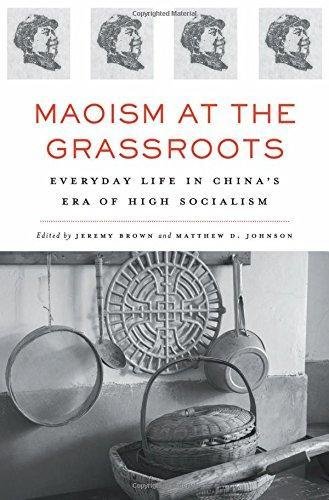Details
Author
Jeremy Brown (Editor), Matthew D. Johnson (Editor), Jacob Eyfert, H (Contributions), Wang Haiguang (Contributions), Yang Kuisong (, Contributions), Daniel Leese (Contributions), Sha Qingqing (Cont, Ributions), Sigrid Schmalzer (Contributions), Michael Schoenhal
Publishers
Harvard 2015-10-02, Cambridge, Massachusetts, 2015
State of preservation
As New
Description
8vo, Synopsis: Maoism at the Grassroots challenges state-centered views of China under Mao, providing insights into the lives of citizens across social strata, ethnicities, and regions. It reveals how ordinary people risked persecution and imprisonment in order to assert personal beliefs and identities, despite political repression and surveillance. Review: "Maoism at the Grassroots" showcases the exciting new scholarship being produced by the rising generation of historians of the People s Republic of China. These chapters portray Mao-era society and politics with startling intimacy and humanity, drawing on a range of new sources that bring everyday experiences at the grassroots into sharp focus.--Andrew G. Walder, author of "China Under Mao: A Revolution Derailed" As a work of cultural history, "Maoism at the Grassroots" seeks to complicate interpretations of China s Mao era (1949 1976) through an examination of diverse and shared experiences of everyday life As in the best edited volumes, each section of this book is nicely linked to the others and the authors make connections across the chapters rather than writing in isolation This book is a must-read for scholars who work on the People s Republic of China and will prove rewarding as well to anyone curious about ordinary life under Communist Party rule. "Maoism at the Grassroots" also makes an important intervention in the larger project of writing modern Chinese history. Until recently, Western books on China were primarily written by white men and the occasional white woman. This volume features scholarship from an impressive array of both Western and Chinese academics, many of the latter being translated into English for the first time. This marks a turning point in the production of historical scholarship on the Mao era, and hopefully is an indication of growing collaboration among scholars in different parts of the West and in China.--Sarah Mellors"Los Angeles Review of Books" (11/23/2015)" As a work of cultural history, Maoism at the Grassroots seeks to complicate interpretations of China's Mao era (1949-1976) through an examination of diverse and shared experiences of everyday life. As in the best edited volumes, each section of this book is nicely linked to the others and the authors make connections across the chapters rather than writing in isolation. This book is a must-read for scholars who work on the People's Republic of China and will prove rewarding as well to anyone curious about ordinary life under Communist Party rule. Maoism at the Grassroots also makes an important intervention in the larger project of writing modern Chinese history. Until recently, Western books on China were primarily written by white men and the occasional white woman. This volume features scholarship from an impressive array of both Western and Chinese academics, many of the latter being translated into English for the first time. This marks a turning point in the production of historical scholarship on the Mao era, and hopefully is an indication of growing collaboration among scholars in different parts of the West and in China.--Sarah Mellors"Los Angeles Review of Books" (11/23/2015) A new generation of Chinese and Western scholars is enriching the history of Mao Zedong's China with material from discarded personnel files, diaries, and unpublished manuscripts purchased from paper recyclers, as well as from recently opened local archives. Their view from below challenges the cliched images of regimented masses fanatically loyal to the revolution.--Andrew J. Nathan"Foreign Affairs" (02/10/2016) For years, Maoist China was opaque from the outside--interpretable only by what a trickle of refugees said or by inference from government references to 'the masses.' That bland term is now passe, but the Western tendency to homogenize the common folk of China persists, especially in fields related to international relations, where scholars and journalists casually refer to 'the Chinese' as

Find out how to use
Find out how to use

